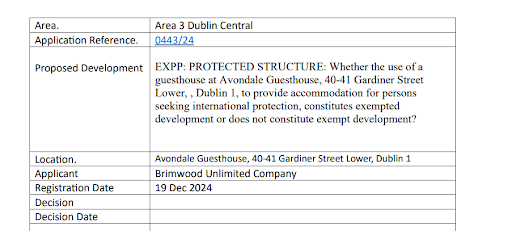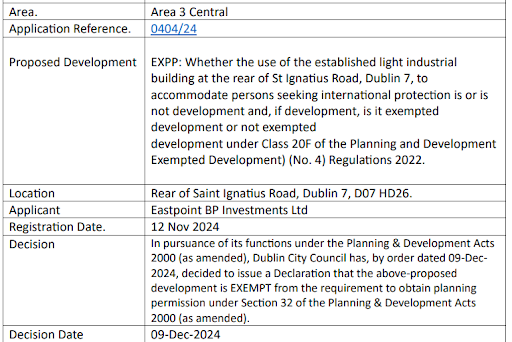Four queries regarding permissions for accommodation centres for persons seeking International Protection were made to Dublin City Council in the weeks before Christmas.
The flurry of Christmas can mean that possibly controversial proposals or queries are less likely to be noticed at this time of the year.
It is also perhaps significant that two of the applications refer directly to an exemption, Class 2F of Schedule 2 of the Planning and Development regulations, that was referred to by Justice Holland in his decision last October on an application by three persons seeking to halt the development of the Crown Paints site in Coolock for use as an asylum accommodation centre. The other two applications would appear to refer to the regulation in question by inference.
Class 2F of Schedule 2 of the Planning and Development regulations allows certain developments to be exempt from the normal restrictions on temporary constructions under Statutory Instrument 376/2023 which was specifically issued on foot of EU Directive 2022/384 which is the March 4, 2022 Directive allowing for the accommodation of Ukrainian refugees under Temporary Protection.
That gives effect to 2001/55/EC which is the Directive covering temporary protection in emergencies – which the Irish state signed up to in 2003.
In relation to the pre-Christmas applications, the last was made in relation to Avondale Guesthouse in Dublin 1.

While the application for the conversion of use of Avondale guest house on Gardiner Street does not specify exemptions under Class 2F it is clear that it is related to this as it requests whether a proposed new accommodation centre for persons seeking International Protection “constitutes exempted development or does not constitute exempted development?”.
It is possible that the application related to Avondale was prompted by the decision made by Dublin City Council on December 9 that a proposed IPAS accommodation centre in Phibsborough is exempt from normal planning regulations under Class 20F. This had been made by Eastpoint BP Investments.

Eastpoint is jointly owned by Ciaran McIntyre and Ruairi O’Neill. In 2023, the company managed, despite an objection by a neighbour, to get permission to house IP applicants in two houses on Charleston Road in Ranelagh.
Eastpoint had also queried whether another proposed transition from office space at Wentworth House, Hogan Place, Dublin 2 was exempt but the Council decided on December 19 to request further information.
An exemption certificate under Class 20F was granted on December 13 to Fund BCP Management for the conversion of office space in the Distillery Building at Fumbally Lane for use as accommodation for International Protection applicants.
BCP is owned by BCP Asset Management which was fined €210,000 by the Central Bank in 2017 for breaches of conduct of business rules. Its current directors include Aidan Williams (appointed this year) who is on the Board of NAMA. Its CEO is John Calvert.
There is no listed owner for the Avondale Guesthouse but it was sold in 2018 to an “investor” through KPMG who were part of a liquidation of the previous owner. The owner of Othello Guesthouses which appears to have bought at least two of the premises is Tynan Investments which is entirely owned by Martin Tynan.
The application to Dublin City Council was made by Brimwood Unlimited – which may be managing the site rather than being the actual owners – and which followers of the booming accommodation sector will know is owned by former Monaghan gaelic football manager Seamus ‘Banty’ McEneaney and family. Brimwood and other McEneaney companies have benefitted hugely from asylum.
Brimwood has been one of the biggest beneficiaries of cheques from the Department of Children. Equality, Disability, Integration and Youth (DCEDIY) – in 2023 alone they drew down almost €36 million.
While elections, opinion polls, and widespread local protests forced the state and the multi-billion accommodation sector to place somewhat of a moratorium on the placing of centres, there is an expectation that this will be lifted over the coming weeks. That is another possible reason for the anxiety of companies involved in the sector to clarify the position with regard to exemptions.
The sheer numbers arriving require that places are provided for the hundreds who are added weekly to the more than 33,000 already in IPAS accommodation. It is clear there are no foreseeable political difficulties facing the new government formation, with a likely secure majority including TDS who might otherwise be critical of the placing of centres.
The Westmeath County Council motion to halt work on a new centre at Lissywollen outside Athlone has caused some difficulty for the state. The state conceded on their objection when it was brought to the court but even that would appear to have failed to prevent actual physical work on the site. That led to renewed protests before Christmas and the focus of opposition will likely shift back to this form of opposition in the almost total absence of effective political objections or support for the protestors.